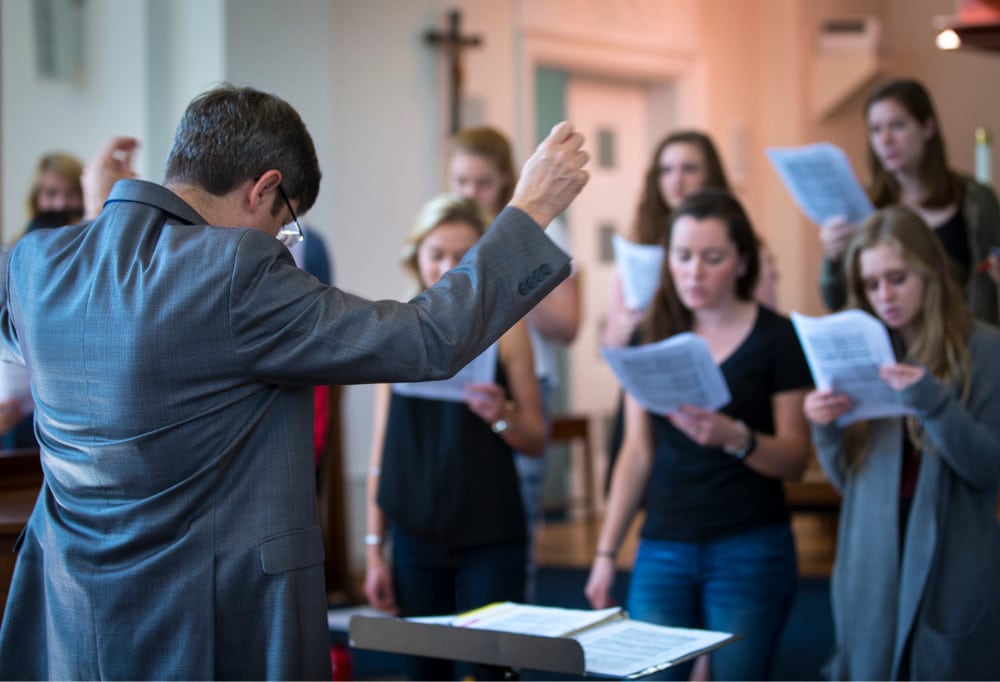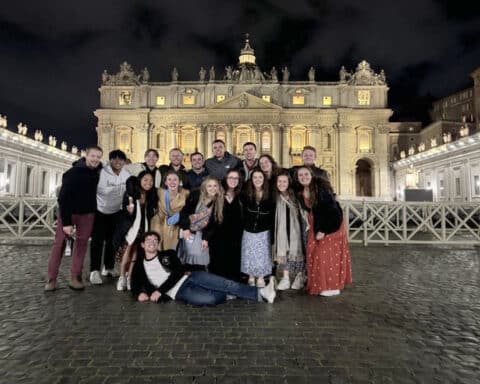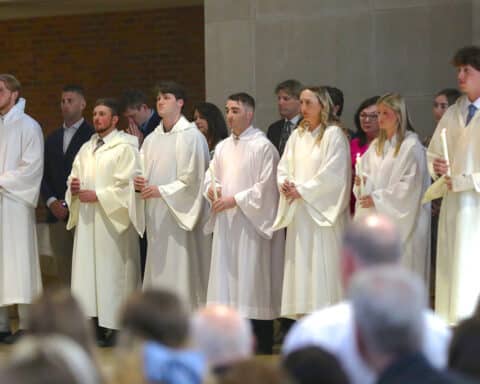The history of Western music would not be what it is today without the influence of the Catholic Church. In music programs at Catholic colleges and universities around the country, the Catholic faith plays a crucial role in the course of study.
“Music is an integral part of culture,” said Kurt Poterack, assistant professor of music at Christendom College in Front Royal, Virginia, where he has taught for 22 years. “Music shapes the soul of a nation, so those who can critically reflect on it can also reform or improve it.”
Christendom’s liturgical music courses look not only at the practical “how to” of liturgical music, but they also explore a theology of worship. “I believe it is important to incorporate the Faith into music courses, because music has such an integral role in worship and liturgy,” said Therese Ohotnicky, a senior majoring in classical and early Christian studies and philosophy with a minor in liturgical music. “This ever-presence of music should be well-informed by the truths and traditions of the Faith to ensure the proper and most beautiful worship of God.”
Read more Fall College Section stories here.
The approach to music education at Christendom College is grounded in the Church’s understanding of music as an integral part of the worship of God. While, of course, not all music is liturgical or explicitly directed toward God, music does play a crucial role in the Church’s life and liturgy. Christendom’s music students strive to find in music a path to worship and a path for faith to seek understanding.
‘God’s gift to us’
The mission of Benedictine College in Atchison, Kansas, is to educate “men and women within a community of faith and scholarship.” The primary faith instruction is in theology courses, of course, but “other disciplines provide the opportunity to discover truth in all its aspects,” said John F. Paul, professor of music and the department chair. “The purpose of a Catholic liberal arts education is to develop faith and reason.”
It is not a purely theoretical approach, by any means. Vocational training in music is part of the course of study at Benedictine. Recently, the music department developed a liturgical music program to help prepare students to serve in a parish setting.
“My teaching is grounded in the belief that we are created in the image of a creator God, therefore we are all creative,” Paul said. “Music is God’s gift to us, to help us express our humanity. It helps God communicate with us.”
The role of the Catholic faith in music is on full display in music history courses, Paul said. “In my music history classes, I show how music has been seen through the centuries, how it has been vital to the liturgy, and how the Church’s traditions have been integral to the development of Western music,” Paul said. “My purpose is to develop an awareness and appreciation of different approaches to beauty.”
Timothy Tharaldson is an assistant professor and the director of choral activities at Benedictine. “Almost all of the music in the courses I teach is based on sacred text,” Tharaldson said. “This allows me to incorporate many different aspects of the Faith as we, as an ensemble, explore the gifts that the text is presenting to us.” Tharaldson teaches courses in liturgical music, emphasizing how music is a part of the liturgy and not a performance that happens at the same time. He also teaches composition and tries to “help students find those answers of how they incorporate the Faith in their own voice and own music.”
Elevating what is good
One reason for the teaching of music in a theological context (and theology in a musical context) can be found in the Second Vatican Council’s document Sacrosanctum Concilium: “The musical tradition of the universal Church is a treasure of inestimable value, greater even than that of any other art. The main reason for this pre-eminence is that, as sacred song united to the words, it forms a necessary or integral part of the solemn liturgy” (No. 112)
The foundation of Benedictine’s music department is the claim that Jesus Christ is the Logos and the origin of all truth and beauty, said Celeste Lirette, a senior double-majoring in theology and music. “Because we believe in the intelligibility of the universe, we are taught that music is intrinsically ordered and can reveal truth about God and his creation,” she said. “Specifically, we incorporate the Faith by connecting the material we learn and the skills we practice to their application in the Church and in the history of salvation.”
Music history courses, for example, help students appreciate and internalize the treasures of chant, the development of polyphony during the renaissance, the Baroque masters like Bach and Vivaldi, the classical giants like Haydn and Mozart, and more.
Most of the music students apply what they learn in class on campus, especially as liturgical musicians at campus liturgies. This emphasis on applying their musical studies in a practical way, and in particular in the context of the liturgy, is an important facet of their education.
“Keeping the Faith at the center of our musical studies is absolutely crucial to understanding the truth about music in our secularized and relativized culture today,” Lirette said. “The Christ-centered formation we receive enables us with the tools to encounter modern culture and elevate what is good, especially in the musical realm, and also correct what is against the good and the beautiful.”
Paul Senz writes from Oklahoma.





